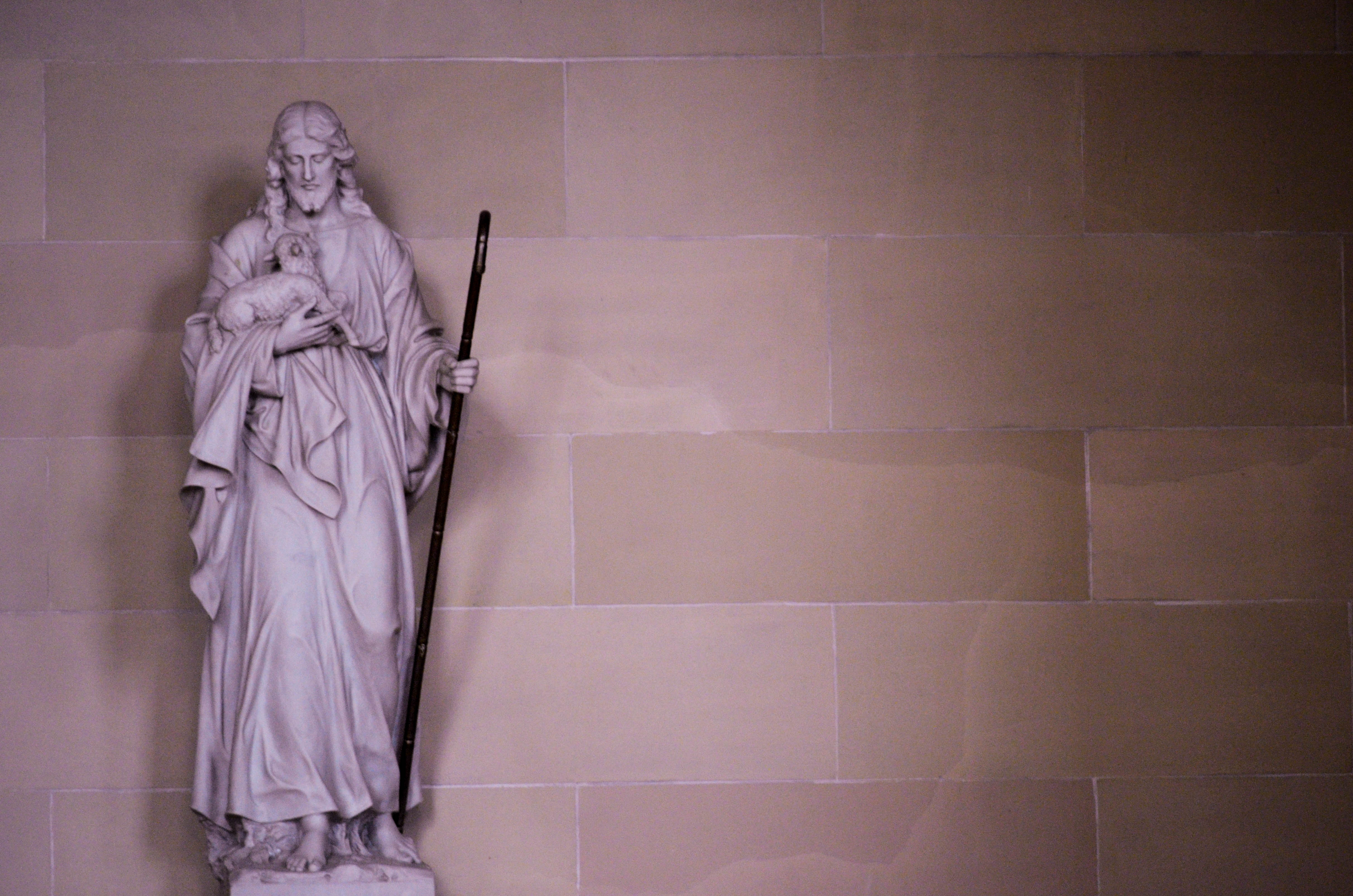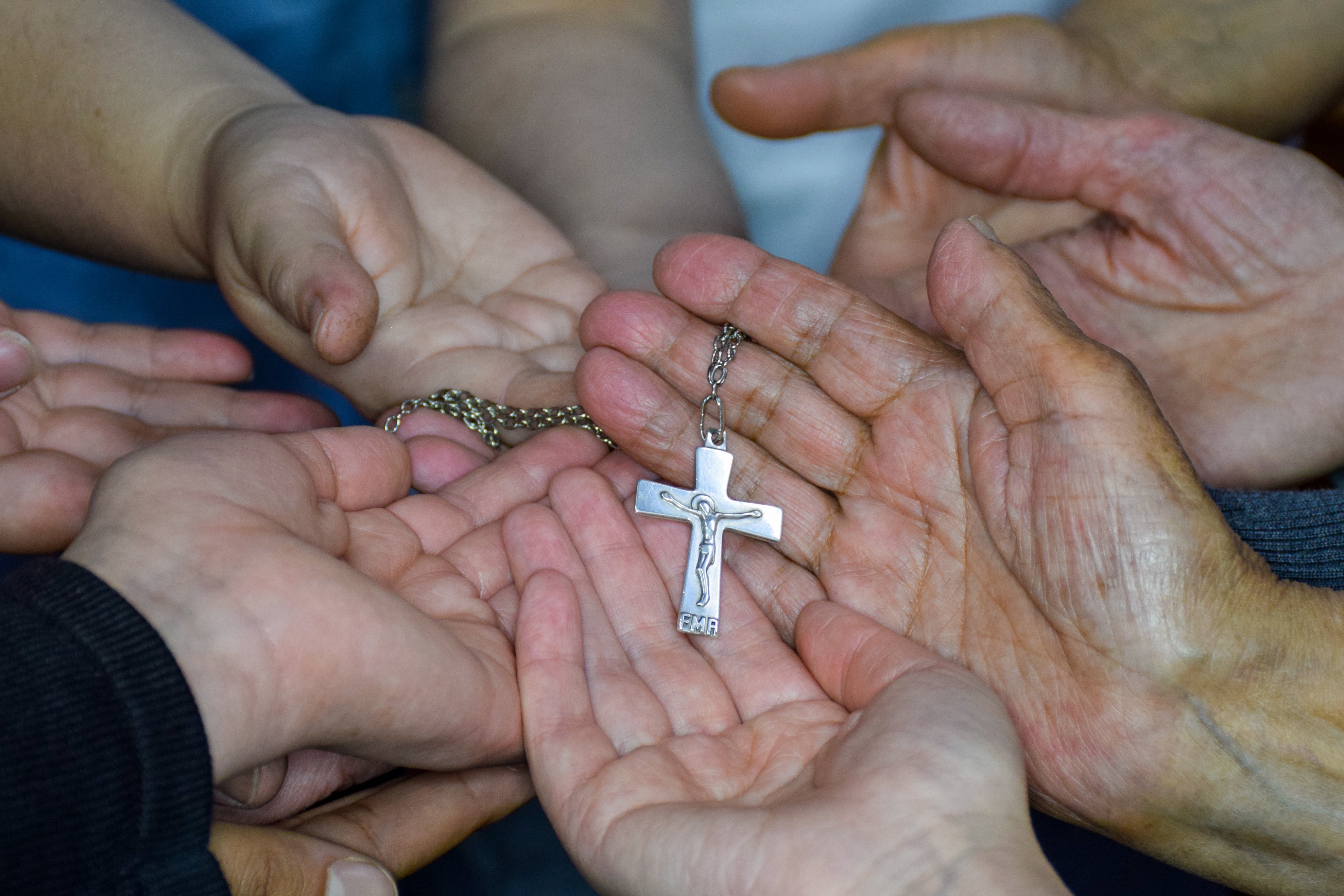Shepherds use a tool called a shepherd’s hook. It is used to beat off those who would hurt the flock, to support weak or hurt sheep and to draw back a sheep who is wandering off.
Today’s Gospel is somewhat like the shepherd’s staff, a seemingly simple tool with multiple purposes.
As the pagan woman approaches Jesus to beg for help for her daughter, Jesus brushes her off. It seems even the disciples are taken aback and appeal to Jesus to give the woman what she wants. (Although we can’t be sure that the disciples didn’t just want her to get what she wanted so she would leave them alone.) We expect Jesus to lift this woman up and draw her close, but it feels more like he is pushing her away.
We have to take a closer look at the context of this story. Matthew tells us that the woman is a Cannanite. In the Old Testament, the Cannanites are characterized as evil and sinful idolaters. There is a history between the pagan Cannanites and the Isrealites and it is a history of division. There is a huge cultural gulf between this woman and Jesus’s followers. It is at this point that Jesus seemingly treats the woman harshly. Jesus wants the disciples to become aware that they themselves hold this woman to be “less than” because she is not one of God’s chosen people.
“It is not right to take the little children’s food and give it to the dogs.” This statement doesn’t reflect how Jesus viewed the woman, it reflects the attitude of the disciples. The words hold up a mirror for the disciples to examine their own cultural biases and their own openness to really reaching out to the people around them.
The woman had started by calling Jesus, “the Son of David”. She knew enough to call Jesus by this name. Was that a spark of faith? By responding to Jesus that even the dogs can eat the scraps left by the children, she went beyond a simple faith born from hope that her daughter could be healed, to a recognition that Jesus could help more than just the Chosen People. Her faith brings about an invitation to salvation.
We too can feel the shepherd’s crook in our lives. When we are weak and in danger, we can be lifted and drawn back to God’s heart. But we can also feel the sting of Jesus’ words. How open are we to all of our brothers and sisters? Do we care more for our own plans and worldview or are we willing to open our hearts and minds to love as Jesus loves? Do we share the invitation to salvation we have received with all those in our little corner of the world?
Los pastores utilizan una herramienta llamada el bastón del pastor. Se usa para ahuyentar a los que harían daño al rebaño, para apoyar a las ovejas débiles o lastimadas y para hacer regresar a una oveja que se está alejando.
El Evangelio de hoy es algo así como el bastón del pastor, una herramienta aparentemente simple con múltiples propósitos.
Cuando la mujer pagana se acerca a Jesús para pedir ayuda para su hija, Jesús la ignora. Parece que incluso los discípulos se sorprenden y apelan a Jesús para que le dé a la mujer lo que quiere. (Aunque no podemos estar seguros de que los discípulos no solo querían que ella obtuviera lo que quería para que los dejara en paz). Esperamos que Jesús levante a esta mujer y la acerque, pero más parece como si la estuviera empujándo para afuera.
Tenemos que echar un vistazo más de cerca al contexto de esta historia. Mateo nos dice que la mujer es cannanita. En el Antiguo Testamento, los cannanitas se caracterizan como idólatras malvados y pecadores. Hay una historia entre los cannanitas paganos y los israelitas y es una historia de división. Hay un enorme abismo cultural entre esta mujer y los seguidores de Jesús. Es en este punto que Jesús aparentemente trata a la mujer con dureza. Jesús quiere que los discípulos tomen conciencia de que ellos mismos consideran a esta mujer como “menos que” porque no es una de las elegidas de Dios.
“No está bien quitarles el pan a los hijos para echárselo a los perritos”. Esta declaración no refleja cómo Jesús vio a la mujer, refleja la actitud de los discípulos. Las palabras sostienen un espejo para que los discípulos examinen sus propios prejuicios culturales y su propia apertura para llegar realmente a las personas que los rodean.
La mujer había comenzado llamando a Jesús, “el Hijo de David”. Ella sabía lo suficiente como para llamar a Jesús por este nombre. ¿Fue eso una chispa de fe? Al responder a Jesús que incluso los perros pueden comerse las sobras que dejan los niños, ella fue más allá de una simple fe nacida de la esperanza de que su hija pudiera ser sanada, al reconocer de que Jesús podía ayudar más que al Pueblo Elegido. Su fe suscita una invitación a la salvación.
Nosotros también podemos sentir el bastón del pastor en nuestras vidas. Cuando somos débiles y estamos en peligro, podemos ser levantados y acercados de nuevo al corazón de Dios. Pero también podemos sentir el aguijón de las palabras de Jesús. ¿Qué tan abiertos estamos a todos nuestros hermanos y hermanas? ¿Nos preocupamos más por nuestros propios planes y visión del mundo o estamos dispuestos a abrir nuestros corazones y mentes para amar como Jesús ama? ¿Compartimos la invitación a la salvación que hemos recibido con todos aquellos en nuestro pequeño rincón del mundo?
 Sheryl is happy to be the number 1 cheerleader and supporter for her husband, Tom who is a candidate for the Permanent Diaconate in the Diocese of Kalamazoo. They are so grateful for the opportunity to grow together in this process. Sheryl’s day job is serving her community as the principal for St. Therese Catholic School in Wayland, Michigan. Since every time she thinks she gets life all figured out, she realizes just how far she has to go, St. Rita of Cascia is her go-to Saint for intercession and help. Home includes Carlyn, a very, very goofy Golden Retriever and Lucy, our not-so-little rescue puppy.
Sheryl is happy to be the number 1 cheerleader and supporter for her husband, Tom who is a candidate for the Permanent Diaconate in the Diocese of Kalamazoo. They are so grateful for the opportunity to grow together in this process. Sheryl’s day job is serving her community as the principal for St. Therese Catholic School in Wayland, Michigan. Since every time she thinks she gets life all figured out, she realizes just how far she has to go, St. Rita of Cascia is her go-to Saint for intercession and help. Home includes Carlyn, a very, very goofy Golden Retriever and Lucy, our not-so-little rescue puppy.
Feature Image Credit: Angie Menes, www.cathopic.com/photo/14748-buen-pastor


 Dr. Alexis Dallara-Marsh is a board-certified neurologist who practices in Bergen County, NJ. She is a wife to her best friend, Akeem, and a mother of two little ones on Earth and two others in heaven above.
Dr. Alexis Dallara-Marsh is a board-certified neurologist who practices in Bergen County, NJ. She is a wife to her best friend, Akeem, and a mother of two little ones on Earth and two others in heaven above.


 Kathryn James Hermes, FSP, is the author of the newly released title
Kathryn James Hermes, FSP, is the author of the newly released title
 Susan Ciancio has a BA in psychology and a BA in sociology from the University of Notre Dame, with an MA in liberal studies from Indiana University. For the past 19 years, she has worked as a professional editor and writer, editing both fiction and nonfiction books, magazine articles, blogs, educational lessons, professional materials and website content. Thirteen of those years have been in the pro-life sector. Currently Susan freelances and writes weekly for HLI, edits for American Life League, and is the executive editor of Celebrate Life Magazine. She also serves as executive editor for the Culture of Life Studies Program—an educational nonprofit program for K-12 students. You can reach her at
Susan Ciancio has a BA in psychology and a BA in sociology from the University of Notre Dame, with an MA in liberal studies from Indiana University. For the past 19 years, she has worked as a professional editor and writer, editing both fiction and nonfiction books, magazine articles, blogs, educational lessons, professional materials and website content. Thirteen of those years have been in the pro-life sector. Currently Susan freelances and writes weekly for HLI, edits for American Life League, and is the executive editor of Celebrate Life Magazine. She also serves as executive editor for the Culture of Life Studies Program—an educational nonprofit program for K-12 students. You can reach her at 
 Tami Urcia grew up in Western Michigan, a middle child in a large Catholic family. She spent early young adulthood as a missionary in Mexico, studying theology and philosophy, then worked and traveled extensively before finishing her Bachelor’s Degree in Western Kentucky. She loves tackling projects, finding fun ways to keep her little ones occupied, quiet conversation with the hubby and finding unique ways to love. She works at for Christian Healthcare Centers, is a guest blogger on
Tami Urcia grew up in Western Michigan, a middle child in a large Catholic family. She spent early young adulthood as a missionary in Mexico, studying theology and philosophy, then worked and traveled extensively before finishing her Bachelor’s Degree in Western Kentucky. She loves tackling projects, finding fun ways to keep her little ones occupied, quiet conversation with the hubby and finding unique ways to love. She works at for Christian Healthcare Centers, is a guest blogger on 
 Leslie Sholly is a Catholic, Southern wife and mother of five, living in her hometown, Knoxville, Tennessee. She graduated from Georgetown University with an English major and Theology minor. She blogs at
Leslie Sholly is a Catholic, Southern wife and mother of five, living in her hometown, Knoxville, Tennessee. She graduated from Georgetown University with an English major and Theology minor. She blogs at 
 Deacon Dan Schneider is a retired general manager of industrial distributors. He and his wife Vicki have been married for over 50 years. They are the parents of eight children and thirty grandchildren. He has a degree in Family Life Education from Spring Arbor University. He was ordained a Permanent Deacon in 2002. He has a passion for working with engaged and married couples and his main ministry has been preparing couples for marriage.
Deacon Dan Schneider is a retired general manager of industrial distributors. He and his wife Vicki have been married for over 50 years. They are the parents of eight children and thirty grandchildren. He has a degree in Family Life Education from Spring Arbor University. He was ordained a Permanent Deacon in 2002. He has a passion for working with engaged and married couples and his main ministry has been preparing couples for marriage.
 Emily Jaminet is a Catholic author, speaker, radio personality, wife, and mother of seven children. She earned a bachelor’s degree in mental health and human services from the Franciscan University of Steubenville. She is the co-founder of
Emily Jaminet is a Catholic author, speaker, radio personality, wife, and mother of seven children. She earned a bachelor’s degree in mental health and human services from the Franciscan University of Steubenville. She is the co-founder of 


 Kate Taliaferro is an Air Force wife and mother. She is blessed to be able to homeschool, bake bread and fold endless piles of laundry. When not planning a school day, writing a blog post or cooking pasta, Kate can be found curled up with a book or working with some kind of fiber craft. Kate blogs at
Kate Taliaferro is an Air Force wife and mother. She is blessed to be able to homeschool, bake bread and fold endless piles of laundry. When not planning a school day, writing a blog post or cooking pasta, Kate can be found curled up with a book or working with some kind of fiber craft. Kate blogs at 
